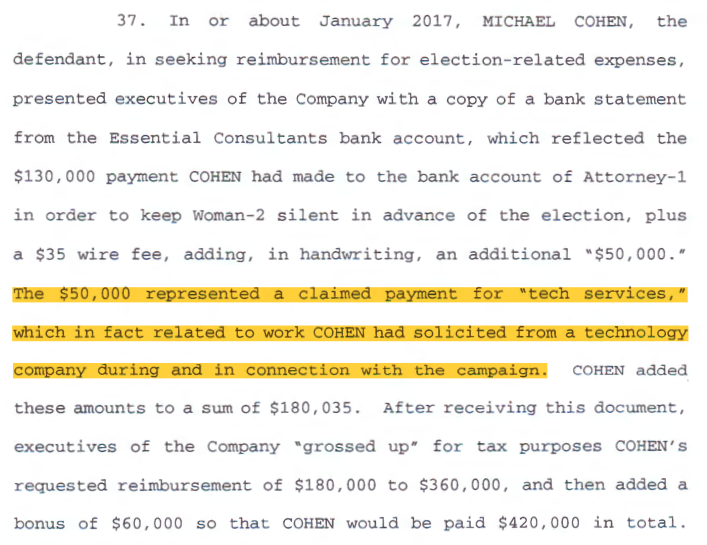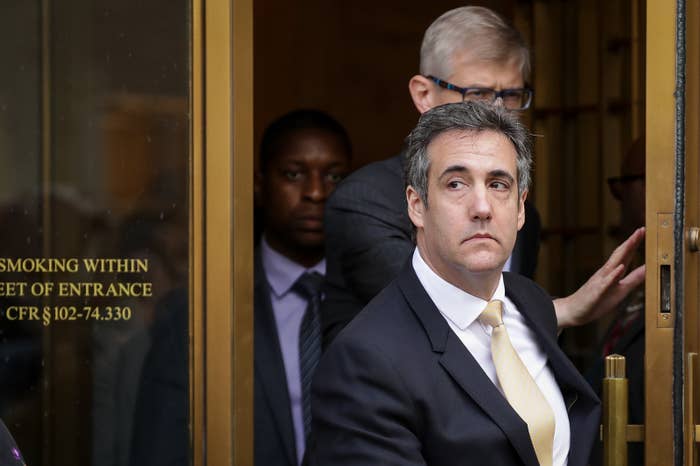
Michael Cohen's guilty plea is just the beginning.
That much was clear on Wednesday, the day after the president's longtime personal lawyer pleaded guilty to campaign finance violations and told a court in New York that it was at Donald Trump's direction that he'd made hush money payments during the 2016 presidential campaign to two women who alleged affairs with the then-candidate.
"If those payments were a crime for Michael Cohen, then why wouldn't they be a crime for Donald Trump?" was the question posed by Cohen's lawyer, Lanny Davis.
Questions also remain unanswered about what, if anything, would happen regarding the unnamed people who prosecutors said played key roles in the events that led to Cohen's guilty pleas — one or more unnamed campaign officials who discussed the payments with Cohen, the Trump Organization employees involved in repaying Cohen, and the media executives involved in the efforts to prevent the women's stories from becoming public — and whether they were cooperating with the prosecutors.
For her part, White House press secretary Sarah Huckabee Sanders stuck to a tight script at Wednesday afternoon's briefing, telling multiple reporters in response to a range of questions that Trump had "done nothing wrong" and "faces no charges."
At times, she referred reporters to Trump's outside lawyers and also noted, "There is no collusion."
Trump, too, defended himself, tweeting and telling Fox News that the payments were not illegal, despite Cohen's guilty pleas. Trump's outside lawyer, Rudy Giuliani, replied succinctly on Wednesday morning to questions about the charges: "None against the president."
Michael Cohen plead guilty to two counts of campaign finance violations that are not a crime. President Obama had a big campaign finance violation and it was easily settled!
A day after Cohen pleaded guilty to eight counts of tax evasion, false statements to a bank, and campaign finance violations, it was the latter charges that continued to draw the most attention: an unlawful corporate campaign contribution in the form of $150,000 paid by American Media Inc. to former Playboy model Karen McDougal to buy the "rights" to her story of an alleged affair with Trump, and for making an excessive campaign contribution, the $130,000 Cohen paid to adult film star Stormy Daniels for her silence on an alleged relationship with Trump.
What did Trump say?
In his interview with Fox News, to be broadcast Thursday morning on Fox & Friends, Trump was asked if he knew about the payments.
"Later on I knew," he said. "Later on." (In early April, Trump had simply replied, "No," when asked if he had known about the payment to Daniels.)
In this week's Fox News interview, Trump added: "They didn't come out of the campaign. They came from me," telling Ainsley Earhardt, "I tweeted about it. I don't know if you know, but I tweeted about the payments." In early May, Trump had tweeted about money paid to Cohen — calling it a "monthly retainer" — and saying that from those payments Cohen "entered into" the agreement with Daniels.
Mr. Cohen, an attorney, received a monthly retainer, not from the campaign and having nothing to do with the campaign, from which he entered into, through reimbursement, a private contract between two parties, known as a non-disclosure agreement, or NDA. These agreements are.....
...very common among celebrities and people of wealth. In this case it is in full force and effect and will be used in Arbitration for damages against Ms. Clifford (Daniels). The agreement was used to stop the false and extortionist accusations made by her about an affair,......
...despite already having signed a detailed letter admitting that there was no affair. Prior to its violation by Ms. Clifford and her attorney, this was a private agreement. Money from the campaign, or campaign contributions, played no roll in this transaction.
What do the charging documents say?
In the charging documents filed against Cohen, to which he pleaded guilty, a very different picture was laid out. According to the information, Cohen used money from a home equity line of credit to pay the $130,000 to Daniels.
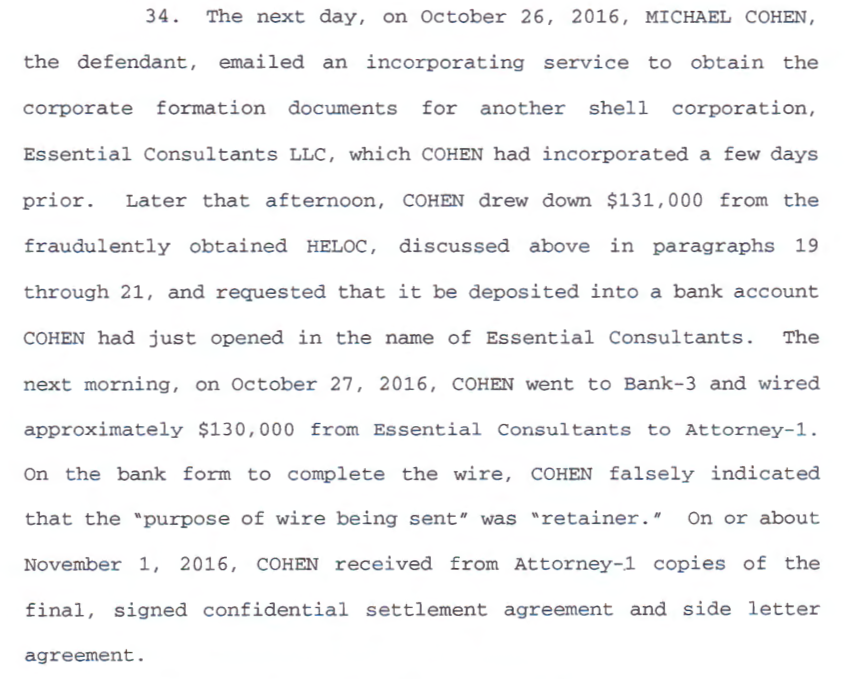
It was only after the election, in January 2017, per the information, that Cohen sought reimbursement for the expense, presenting "a copy of a bank statement from the Essential Consultants bank account" to officials at the Trump Organization, who characterized the repayment — made through Trump's trust account — as a "retainer."
Once the Wall Street Journal reported in January 2018 about the payment to Daniels, Cohen said in a statement that he had used his "own personal funds to facilitate a payment of $130,000 to Ms. Stephanie Clifford," Daniels' legal name. He added, "Neither the Trump Organization nor the Trump campaign was a party to the transaction with Ms. Clifford, and neither reimbursed me for the payment, either directly or indirectly."
The information does not name the Trump Organization, referring to it as the "Company." It does detail, though, that multiple unnamed executives at the company worked to ensure Cohen's repayment was made, paid in $35,000 monthly payments characterized as a "retainer" and totaling $420,000.
Despite Trump's tweets and the characterization of the payments by the company, Giuliani told BuzzFeed News on May 2, "It clearly was a payment to reimburse expenses.”
From the May 2 BuzzFeed News story:
“This is like petty cash [to Trump],” Giuliani said. In addition to repaying the $130,000, the arrangement gave Cohen “enough left over for him to profit in [2017].” If Trump paid Cohen $35,000 a month for a year, as Giuliani said, that would be a total of $420,000.
Who else was involved in setting up the payments to the women, and what do the charging documents say about them?
Trump, in his Fox News interview, appeared to argue that the payments weren't excessive campaign contributions because they weren't paid for by the campaign.
"In fact, my first question, when I heard about it, was, 'Did they come out of the campaign?' because that could be a little dicey. They didn't come out of the campaign," Trump said.
The question isn't whether they were paid out of the campaign account, however, but whether they were appropriately characterized as campaign expenses. That's why Cohen noted on Tuesday in court that the payments were made for the "principal purpose of influencing the election."
The documents in Cohen's case, moreover, reference "coordination" with "one or more members of the campaign" in setting up the media company's "offer" in August 2015 to "assist" the campaign.
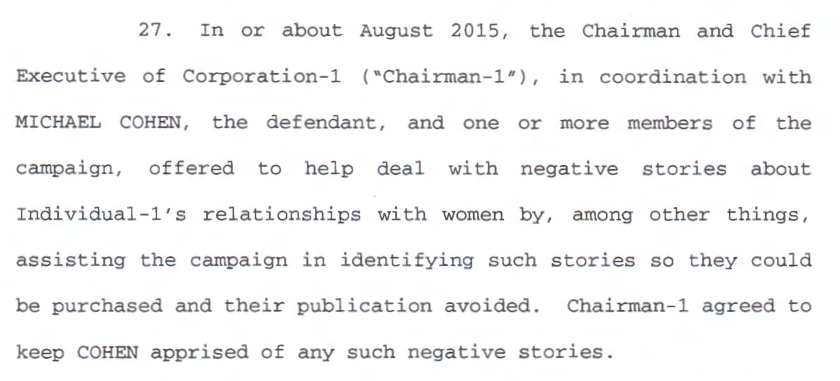
Given what is now public information, the unnamed "Corporation-1" would be AMI, and "Chairman-1" would be AMI chair David Pecker, with whom Trump has a longtime friendship. The information goes on to detail the McDougal deal, including mention of "Attorney-1," her attorney Keith Davidson; "Magazine-1," the National Enquirer; and "Editor-1," Dylan Howard.
On Wednesday night, the Wall Street Journal reported that Pecker had "provided prosecutors with details about payments Mr. Cohen arranged with women who alleged sexual encounters with President Trump, including Mr. Trump’s knowledge of the deals."
The Cohen information states that the payment for McDougal was made "subject to Cohen's promise that Corporation-1 would be reimbursed." Later, the information states that Cohen and the chairman signed an agreement to assign the nondisclosure rights regarding McDougal to Cohen for $125,000, but it goes on to state that the chairman later — but before Cohen paid — told Cohen the agreement was off.
According to the information, "Chairman-1 and Editor-1" also contacted Cohen about a separate matter — when they were told about Daniels' story. At that point, they "put him in touch with Attorney-1, who was also representing" Daniels. When Cohen didn't go through with the deal with Daniels at first, according to the information, the media duo contacted Cohen via an encrypted messaging app.
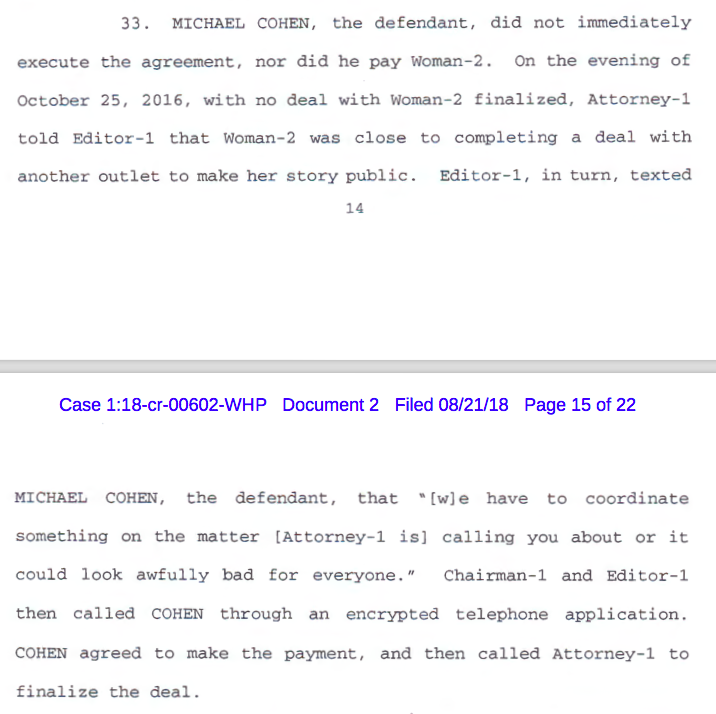
The charge of an excessive campaign contribution in connection with that Daniels payment specifically notes that the expenditure was made "in cooperation, consultation, and concert with, and at the request and suggestion of one or more members of the campaign."
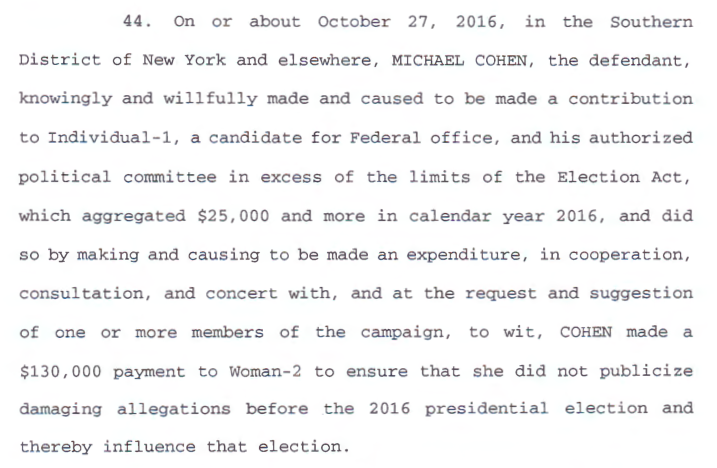
What "tech services" was Cohen involved with during the campaign?
In a section of the information describing the repayment that Cohen was seeking, an odd sentence appears. It details Cohen's claim that he had paid $50,000 for "tech services," which the information states actually related to work Cohen sought "from a technology company during and in connection with the campaign."
No additional information about the claimed payment was provided in the information or other materials.
